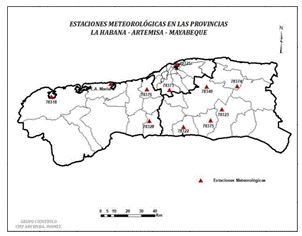Verification of climate forecasts in the Havana, Artemisa and Mayabeque región
Main Article Content
Abstract
The climatic forecasts of the temperature and precipitation variables in the Havana, Artemisa and Mayabeque region are verified, for the period 2019-2021. This evaluation is carried out for the forecasts obtained from the analogue method, those provided by the Climate Prediction Tool (CPT) and the general forecasts made from the linking of both methods with climate models and the criteria of experts. For this, the verification indices Hit Rate, Hit Skill Score, Linear Error of Probability Space and Ranked Probability Score were used, and the rainy and dry periods were studied separately, as well as the different geographical locations of the study area. The best results are obtained by the CPT and the general forecasts, with a total of 120 and 115 forecasts with good results, respectively. The variable that best adjusted to the climate forecasts in this region was the temperature, specifically on the north coast of the study area, the average values of the indices were 63; 44; 35 and 26, respectively, since precipitation presents greater variability.
PALABRAS CLAVE:
Downloads
Article Details

This work is licensed under a Creative Commons Attribution-NonCommercial 4.0 International License.
Those authors who have publications with this journal accept the following terms of the License Attribution-NonCommercial 4.0 International (CC BY-NC 4.0):
You are free to:
- Share — copy and redistribute the material in any medium or format
- Adapt — remix, transform, and build upon the material
The licensor cannot revoke these freedoms as long as you follow the license terms.
Under the following terms:
- Attribution — You must give appropriate credit, provide a link to the license, and indicate if changes were made. You may do so in any reasonable manner, but not in any way that suggests the licensor endorses you or your use.
- NonCommercial — You may not use the material for commercial purposes.
- No additional restrictions — You may not apply legal terms or technological measures that legally restrict others from doing anything the license permits.
The journal is not responsible for the opinions and concepts expressed in the works, they are the sole responsibility of the authors. The Editor, with the assistance of the Editorial Committee, reserves the right to suggest or request advisable or necessary modifications. They are accepted to publish original scientific papers, research results of interest that have not been published or sent to another journal for the same purpose.
The mention of trademarks of equipment, instruments or specific materials is for identification purposes, and there is no promotional commitment in relation to them, neither by the authors nor by the publisher.
References
Barcia, S., Ballester, M., & Cedeño, Y. (2012). Variabilidad espacio-temporal de las variables que intervienen en los pronósticos a corto plazo en Cuba. Informe de Resultado Científico, Resultado No 1, Proyecto Evaluación de los Pronósticos del Tiempo, Instituto de Meteorología INSMET. La Habana, Cuba, 68 p.
Brier, G. W., & Allen, R. A. (1951). Verification of Weather Forecasts. En: Compendium of Meteorology: Prepared under the Direction of the Committee on the Compendium of Meteorology. MALONE, T.F. (ed.). American Meteorological Society: Boston, MA, 841-848 pp.
Ebert , E., Wilson, L., Weigel, A., Mittermaier, M., Nurmi, P., Gill, P., . . . Watkins, A. (2013). Progress and challenges in forecast verification. METEOROLOGICAL APPLICATIONS 130-139 (2013).
Finley, J. P. (1884). Tornado Predictions. American Meteorological Journal 1(3): 85-88.
Jolliffe, I. T., & Stephenson, D. B. (2003). Forecast Verification: A Practitioner's Guide in Atmospheric Science. John Wiley & Sons Ltd., Chichester, West Sussex, England.
Madrigal, J. J. (2020). Análisis de pronósticos climáticos para la previsión de sequías Meteorológicas e Hidrológicas. Tesis Doctoral, Universidad Politécnica de Valencia.
Manubens, N., Caron, L. P., Hunter, A., Bellprat, O., Exarchou, E., Fuckar, N. S., . . . Doblas-Reyes, F. J. (2018). An R package for climate forecast verification. Environmental Modelling & Software 103 29-42.
Moya, A. S., Estrada, A., & Ballester, M. (2013). Evaluación de los pronósticos del tiempo a corto plazo. Informe de Resultado Científico, Resultado 3, Proyecto Evaluación de los Pronósticos del Tiempo, Instituto de Meteorología INSMET. La Habana, Cuba, 55 p.
Murphy, A. H., & Winkler, R. L. (1987). “A general framework for forecast verification”, Monthly Wheater Review, 115 1330-1338.
Pascual, A., Valero, F., Martín, M. L., Morata, A., & Luna, M. Y. (2012). Probabilistic and deterministic results of the ANPAF analog model for Spanish wind field estimations. Atmospheric Research, aceptado. doi:10.1016/j.atmosres.2012.01.011.
Roura, P. (2018). Verificación de las Perspectiva Climáticas. I Foro de Predicción Climática. Cienfuegos. Cuba.

